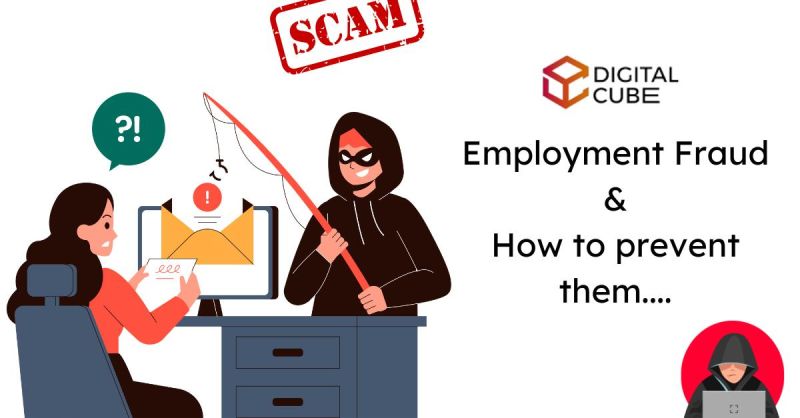- Home
- About Us
- Services
- IT, Digital & technologies
- Non- IT
- Staffing Service
- - Executive Search
- - Project Based Hiring
- - Direct Hire
- - Contract Hiring
- Contingent Staffing
- Outsourcing
- PF ESI Management
- Salary TDS Management
- Labour Compliance Outsourcing
- Compliance Management
Workforce Solution
Payroll & Compliance Management
BGV (Background Verification)
- Solution
- Blog
- Career Zone
- Contact Us
Job Fraud Alert: How to Spot Scams and Protect Yourself

Job Fraud Alert: How to Spot Scams and Protect Yourself
The job market has its challenges, but one of the biggest threats today isn’t just securing employment—it’s avoiding fake job offers. In 2024, 40% of companies posted fake job listings, and 30% still have active fraudulent listings. These alarming numbers show that job seekers need to be vigilant.
Job scams are rising, often disguised as lucrative work-from-home opportunities that promise high returns for minimal effort. This blog aims to educate job seekers on how to recognize fraudulent schemes, take precautions, and safeguard themselves.
Understanding Job Scams
Job scams usually prey on individuals seeking convenience, financial stability, or remote work. A common scam involves companies advertising well-paid, effortless work-from-home jobs. These roles often claim anyone can succeed with minimal registration fees and short training sessions.
Red Flags to Watch Out For:
- Upfront Payment Requests
- Legitimate companies never ask for registration fees, deposits, or training costs.
- Unrealistic Promises
- Offers claiming “earn ₹50,000 by working 2 hours daily” or “no experience needed” should be scrutinized.
- Unprofessional Communication
- Watch out for poorly written emails, no official company domain, or WhatsApp-only correspondence.
- No Verifiable Information
- Lack of physical office addresses, employee details, or credible company reviews online.
Common Scenarios in Job Scams
Personal Story: “I Almost Got Scammed”
When I was eager to earn more, I came across a tempting work-from-home offer. The company assured me I could earn big by investing a small registration fee. Skeptical but desperate, I hesitated—and fortunately, my doubt saved me.
This experience taught me the importance of critical thinking and researching opportunities thoroughly.
Many aren’t so lucky. Countless job seekers fall victim to these scams due to misinformation and desperation.
How to Protect Yourself From Job Scams
1. Verify Company Authenticity
- Research the company’s website and LinkedIn profile.
- Check reviews on platforms like Glassdoor or Trustpilot.
- Contact employees via LinkedIn to confirm job legitimacy.
2. Analyze the Job Posting
- Genuine listings usually include detailed job descriptions, required qualifications, and direct application links on the company’s official website.
- Beware of postings with vague titles like “Online Processor” or “Earn Quick Cash.”
3. Avoid Upfront Payments
- Never pay for a job offer, training materials, or any onboarding fees.
- Legitimate employers invest in you, not the other way around.
4. Trust Your Instincts
- If something feels too good to be true, it probably is. A quick Google search about the job and the company can save you a lot of trouble.
5. Use Job Portals Wisely
- Stick to trusted job portals like LinkedIn, Naukri.com, or Monster.
- Report suspicious activity or listings on these platforms immediately.
What to Do If You Spot a Scam?
- Report It:
- File complaints with cybercrime authorities or job portals.
- In India, use the National Cyber Crime Reporting Portal.
- Educate Others:
- Share your experience with friends or post it online to warn others.
- Seek Legal Assistance:
- If you’ve been defrauded, consult a lawyer or consumer protection agency.
Creating Awareness About Job Scams
Fighting job fraud isn’t just the responsibility of job seekers—it’s a collective effort. Employers, recruitment platforms, and educational institutions should take steps to spread awareness:
- Employers: Ensure transparency in job listings and verify recruitment partners.
- Job Portals: Use AI to flag suspicious listings and educate users on scam detection.
- Educational Institutions: Conduct workshops on safe job-seeking practices.
The Toughest Job: Staying Safe
Navigating the job market today requires not just qualifications but also caution. Be informed, trust your instincts, and always do your homework. Remember, a good job doesn’t cost money—it pays you!

